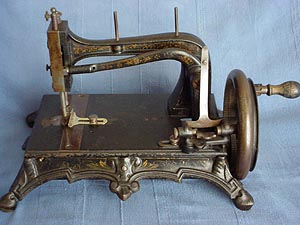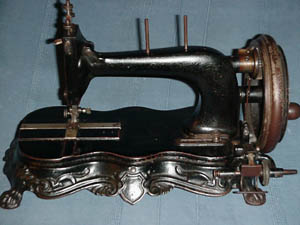
Cast base machine seem to have been particularly popular with German manufacturers and most were produced in vast quantities for export. These machines were often given British sounding names or labeled for specific importers or retailers so the same machine can be known by three or more names!
|
German Introduction |
| German Room 1 |
| German Room 2 |
| German Room 3 |
| L. O. Dietrich (Vesta) |
| Frister and Rossmann |
| Grimme, Natalis & Co. |
| Hengstenberg & Co. Anker |
| Seidel and Naumann |
| Return to The Gallery |
| Home |

Rhenania? Serial No. 81777.
This type of machine was made, with minor variations, by many German manufacturers and was sold under two main names Rhenania and Humboldt. Who manufactured this one is not clear, although it may have been Tittel and Nies, Saalfeld.
It is a version of a Grover and Baker machine. There is no takeup lever instead the thread passes round a pair of discs mounted on top of the needlebar, as the bar rises so thread is drawn from the spool. Although it is in poor condition surprisingly the brass hemmer guide was still attached to the machine.

Elsa: Serial No. 77875. Baach & Klie started manufacturing sewing machines in the mid 1870's and in 1890 moved from 8 Salzdahlumer Street to 34 Gertruden Street, Braunschweig. In 1894 the firms name was changed to "R. Lehnmann formerly Baach & Klie". The Company specialised in producing machines for export and the British Agent was C. Lohmann, 22 Jewin Street, London who by 1895 was trading from 36 Aldersgate Street, London. The Elsa was first produced around 1876 and was still being made in 1912. The firm was still in existence in 1926.
Thanks to Ludger Halbur, David Sterling and Jennifer Hill of the Needlebar Group for information regarding this machine.
Originally we thought this machine was a Naumann Glady's however we have now received information that it is an Elsa made by Baach & Klie and we think it dates to the 1880's.
See pictures of the restoration

Nelson Serial No. 8944. We've not confirmed the actual manufacturer of this machine but it was probably Böttcher of Berlin who produced an identical machine. It is typical of the 1890's with its paw base and with top tension. The handle is of wood not porcelain.
This machine was imported by the American Sewing Machine Company. Established by E. Todd in 1863 the firm specialised in importing and badging machines. By 1882 it was operating from
8 Rose Street, London moving to 7 Ludgate Square, London between 1891 and 1895, where it remained until 1915.
The same type of machine was offered for sale by James G. Weir, and has stamped on the slide plate his trade mark: "Jas G. Weir" and the address 2 Carlisle Street, Soho Square, London, W.

The decals on this machine are in particularly good condition although the name Nelson is just visable on top of the arm. The slide plates are plain steel with the Company name stamped on both. The machines serial number is stamped on the needlebar. Note the primative drop down bobbin winder. Ernst Bötcher started producing sewing machines in 1859 in Berlin. The early machines were based on Wheeler & Wilson and Willcox & Gibbs principles. The firm was reasonably successful and production continued until 1930 when we understand it was purchased by Singer.
Thank you to Graham Forsdyke/Claire Sherwell for their information regarding this machine.
Junker & Ruh Serial No. 190710. Karl Junker and August Ruh formed their company in 1870 in Karlsruhe, Baden. Production increased rapidly and 25,000 sewing machines were made in 1876. By 1878 the company was producing the Original Fidelitas, Original Badenia, Original Kolumbus and the Original Rhenania which was based on the Grover & Baker No.19. The Company developed more modern machines including a High Arm Family transverse shuttle machine branded the Erda and a vibrating shuttle machine known as the Frigga both of which were available in 1901.
Nothmann: Serial No. 287112. Nothmann Brothers operated from Kaiser-Friedrich Street in Berlin from 1878 to 1909 and the Company was taken over by Frister and Rossmann in 1912. By 1895 the wholesale Agent in Great Britain was Ernest Rausnitz, 184 Aldersgate, London.
Nothmann 'Nuttallia': Serial No. 344374
Adam Opel completed his first sewing machine in March 1863 having started work on the design and patterns 8 months previously. Machines were initially made to order and production gradually increased with the firm moving to a new factory in 1868.

Fiddle base Hand crank with an ornate cast base, the decals have all but gone but were originally gold with red pendants around the base. At the bottom of the Pillar it has ' Made in Germany' and beneath that, although the wording is virtually unreadable, 'Especially for Kay & Company Worcester'. Kays still exist and are a large Mail Order Catalogue Company based in Worcester, England.
The bobbin winder on this machine is slightly unusual with a wire "spoon" and "guard".
Thank you to Lyn Forsyth/David Stirling/Claire Sherwell of the Needlebar Group for information regarding this machine.

Fiddle base Hand crank with an ornate cast base, manufactured by Gebr. Nothmann of Berlin c1897. The decals are virtually gone but were originally small roses. Note the position of the bobbin winder which is driven off a straight cut gear - we don't think it's supposed to be that shape!
Unfortunately it is missing a slide plate and its shuttle.
Thanks to Graham Forsdyke for information regarding this Company.

Fiddle base Hand crank manufactured by Gebr. Nothmann of Berlin. The name on the arm is just visible as an impression in the varnish as 'Nuttallia'. It is a transverse shuttle machine with the inlaid ruler to the base and porcelain handle typical to German machines. The decals are quite worn being a golden scroll with decorative green and red areas.


Simplex: Serial No. 521508.
Although this very attractive fiddle base machine bears no makers mark we believe it was made by Adam Opel in Rüsselsheim and probably dates to around 1900.
The name Simplex is just visible on the arm. The bed of the machine has flakes of Mother of Pearl forming a border and the centre decal features two Mother of Pearl Doves. The base has an inlaid ruler but no accessory compartment.
In 1886 the firm started producing bicycles and in 1899 cars were introduced so successful were these that production of sewing machines ceased in 1911 with some one million having been manufactured. General Motors took an 80% stake in the company in 1929 and purchased the remaining shares in 1931.
| German Introduction | German Room 1 |
German Room 2 |
German Room 3 |
L.O. Dietrich (Vesta) |
Frister and Rossmann |
Grimme, Natalis & Co. |
Hengstenberg & Co. Anker |
Seidel and Naumann |
| Back to The Gallery |
Home |
American
Bradbury
British
More British
A-Z British Manufacturers
Canadian
Cases & Bases
L.O.Dietrich
Frister & Rossmann
German
Jones
Gallery
Oldham Manufacturers
Restoration
Shuttles
Singer
Sock Knitters
Toy Machines
What's New
Home